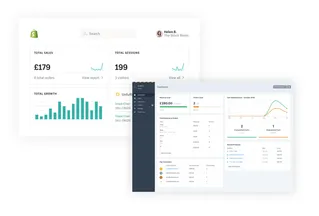Shopify vs Craft Commerce



Starting an eCommerce website is a daunting thought. Clients don't know what CMS they want, why they need it and what the best tool for the job is. In our experience, some clients have been misled and come to us for a better solution and honest advice.
But this is not a one-sided article about which platform is best or why we use Shopify or Craft. We design and build for both platforms (but, as developers, we certainly have our favourite! Cough Craft Commerce Verified Partner). The idea is to outline what each platform can bring to a project, and why you should choose that solution. So let's begin.
One benefit of Shopify is that it is a hosted platform that lets you build an eCommerce website using existing templates and themes. It may need a developer to tweak it to get it how you want it, but essentially you can be up and running fairly quickly.
Craft Commerce is built on top of the very popular Craft CMS which has a tonne of benefits of its own. But essentially this will let you build a more bespoke eCommerce website, and will require technical knowledge (this is where we can help you out, nudge nudge).
Both platforms come with 2 options:
Craft Commerce
Commerce Lite & Commerce Pro
Shopify
Shopify & Shopify Plus
Essentially, both "lite" versions of each platform have limited features, as expected, such as number of items allowed in the basket (Craft Commerce) and high transaction fees (Shopify).
Our general rule of thumb is that if you're starting out selling basic products, and not worried too much about flexibility as you're maybe a startup, then both Shopify and Craft Commerce Lite are a good choice. This is with the addition that Craft Commerce lite will allow you a lot more extensibility.

As features for both platforms go, they are very much the same. They both have good basket options, you can add different variations of products (colours, sizes, etc), mobile/responsive control panels, choices of different gateways (PayPal, Stripe etc), refunds via an order, customer groups, inventory management and the ability to create sales, discounts, and coupon codes.
Shopify though does come with a very good set of analytics and SEO options. But don't let this scare you from choosing Craft Commerce. Plugins like SEOMatic will add amazing SEO functionality and Commerce Widgets will give you stats and analytics for your store.
Craft Commerce trumps Shopify by having a more "content-driven" approach. With Craft Commerce, because it's built on top of Craft CMS, you can create anything, and I mean, anything. Within Shopify, we would be able to design and implement custom pages for you but there would be certain limitations to what can be edited and how elements can be reused.
Shopify does pride itself on its support and is very good at this. This is why we recommend clients that choose Craft Commerce to go on a support plan with us to get this level of support.

Most clients love Shopify because it comes with a whole bag of 3rd party integrations, and generally, these are one-click installs with very little setup or technical knowledge needed. The only downside to this is for each add-on there usually comes a monthly cost. So you rack up a big monthly bill quite quickly.
Craft Commerce is growing its list of 3rd party integrations thanks to the release of the plugin store. Whilst the amount of plugins is nowhere near the scale of Shopify, you might find Craft CMS already comes with features that you'd be paying extra for on Shopify such as order PDF templates, subscriptions and digital products. Or it would be very easy to add in what you require, with no monthly cost.
We highly recommend the following plugins for Craft Commerce:
If you're wanting scalability through the Shopify platform, your only option here is Shopify Plus (pricing is secretive, as it's bespoke per client) This is due to Shopify mainly relying on plugins to extend your commerce store. The base options for Shopify are enough for small or medium stores that don't intend to outgrow the platform anytime soon.
We regularly get clients that have outgrown their Shopify stores, and this is when we recommend Craft Commerce (Either Lite, or Pro depending on the requirements). Because it's built on top of Craft CMS, you have the ability to create multiple stores under one control panel and also have multiple language or regional options (E.g. a UK, German and French store). This is just not possible with Shopify, but Craft Commerce has this in the bag, by default.
The good thing with both platforms is they use a 'handlebars' style coding language (Shopify uses Liquid, and Craft Commerce uses Twig), so moving between the platforms is relatively seamless for a developer.
So, to conclude, if you want a quick store and are happy to customise an existing template Shopify is your go-to. If you want an eCommerce store that can scale and be cost-effective in the long run, Craft Commerce is your solution.
Find out what we think of WooCommerce vs Shopify or Shopify's best plugins.
We offer both Shopify and Craft Commerce development, with MadeByShape being an official Craft Commerce Certified Partner and having built numerous stores including Shopify fashion websites like Riley Studio.
Head over to our project planner to kick start your eCommerce project today.
I’m Jason, Co-Founder, Lead Developer, and full-time human to Sully (My pooch) When he’s not walking me, I’m off cycling or trying not to break something during DIY.